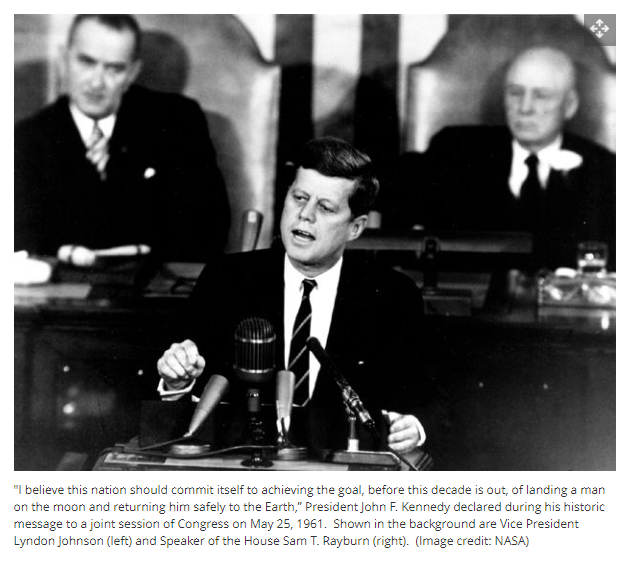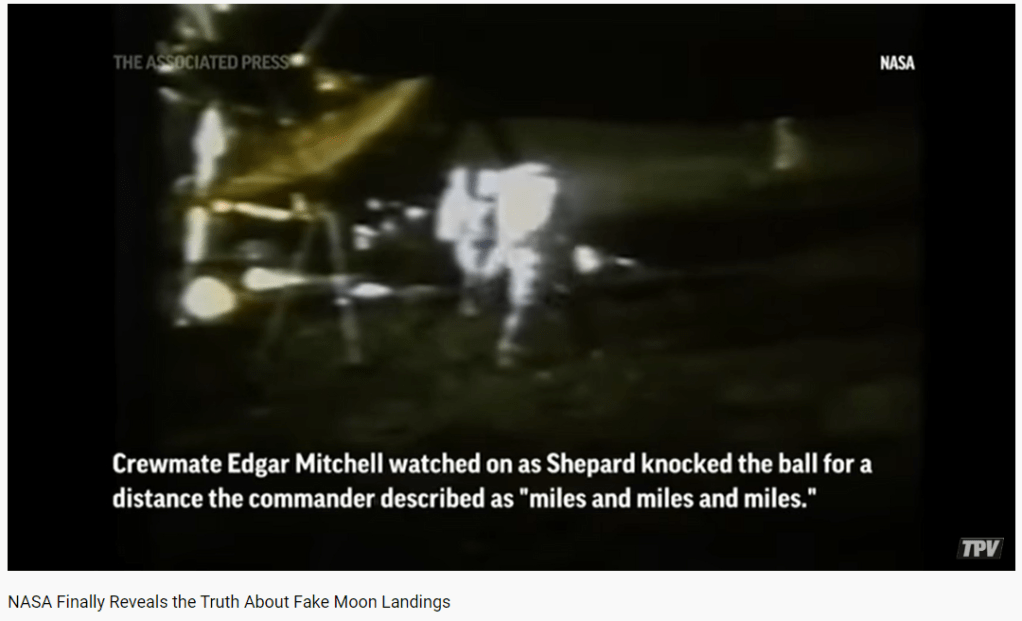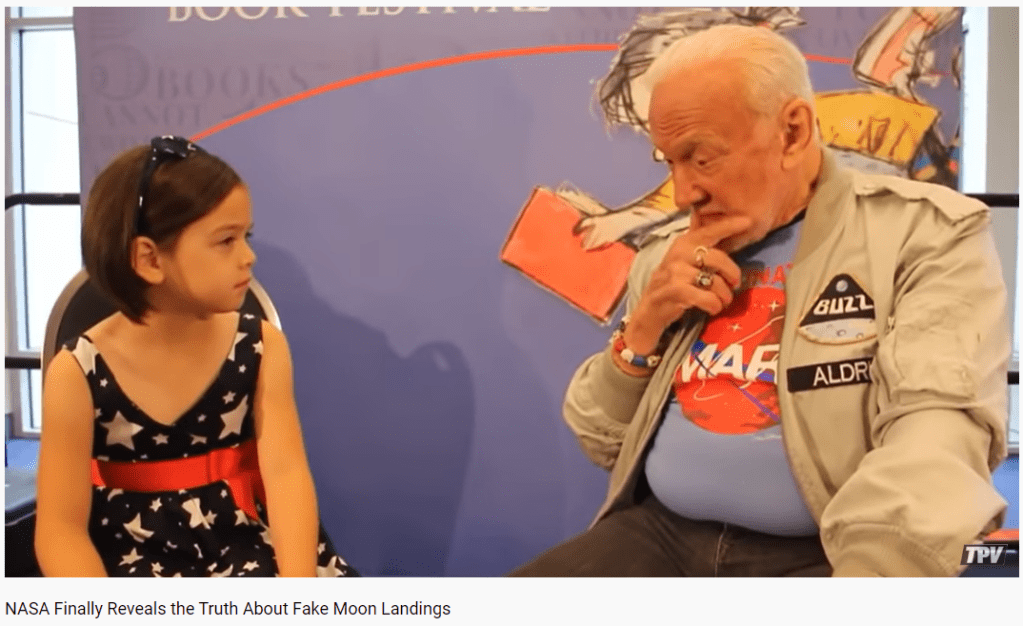Or, did LBJ cunningly set the plan to convince the entire U.S. population (207 million) and the world (roughly 3.6 billion people) that the USA went to the moon in July, 1969?

The context of this content: The point about use of the phrase “You decide” is that this essay should not be construed as being an endorsement of the overall point, but a reasonably informed, objective summary statement of the scenario, and my humble interpretation / presentation. The “Possible Scenario” is just that.
The Apollo Program: The Greatest “Mass Formation Psychosis” Since Hitler’s Rise in the 1930s?
Researcher / author James Fetzer has led the way in questioning the legitimacy of the generally accepted “conventional wisdom” related to the moon landings.[1] In the process, he has assembled multiple compelling facets which, combined, reveal traces of evidence that are convincing and persuasive of his findings. One such item, a video titled “Jay Weidner ‘Kubrick’s Odyssey – How Stanley Faked the Moon Landing’,” is presented below:
The image below was from a scene added by Director Kubrick, for a little humor and “down-home spin,” showing Alan Shepard hit a golf ball for “miles and miles.”

A second, recently produced video, presented below, makes a rather convincing case for the premise that no human has ever been beyond earth’s orbit, or 1,000 miles, whereas the moon is 240,000 miles away. The claim is made that the technical capability to accomplish that did not exist at that point, when computers were still in their nascent phase and were “as big as a house,” having only a small fraction of what is now available on a typical personal computer.
One of the experts interviewed within the video, identified only as a NASA astronaut, had this to say: “I’d love to go to the moon . . . but we’ve lost the technology to do that.”(!) That’s at about the 1:30 mark on the video. and he goes on from there to explain why they allegedly “lost the technology” to return to outer space:
The highly respected French researcher Laurent Guyénot, in a December 25, 2021 column published by The Unz Review, titled “How LBJ Mooned America,” wrote one of the most compelling and detailed accounts of this subject.
The excerpts below reflect how he has determined that President Kennedy had never been the primary advocate for the moon landing objective, and the fact that JFK had determined from James Webb, the NASA administrator, that it was simply not feasible to accomplish in the timeframe that had been established, no matter how much money was thrown at it.
From “How LBJ Mooned America” by Laurent Guyénot
“It is during Nixon’s tenure that men walked on Moon, collected moon rocks, and planted US flags (the last time was in December 1972, almost 50 years ago), but Apollo had really been Johnson’s project from the start. “Few people today realize or remember,” said Alan Wasser, “but a single man, Lyndon Baines Johnson, ‘LBJ’, is primarily responsible for both starting and ending ‘The Space Race’.” “Apollo 11 wouldn’t have happened without Lyndon Johnson,” concurs Michael Marks, quoting John Logsdon, professor at the Space Policy Institute at George Washington University and author of John F. Kennedy and the Race to the Moon (Macmillan, 2010).[4] There seems to be a broad consensus on that point among historians of the NASA. It was Kennedy who very publicly launched the Moon race in 1961, but, unbeknown to the public, “In the weeks before he was assassinated, John F. Kennedy was getting cold feet about the race to the Moon,” according to Charles Fishman, author of a 2019 article titled “If President Kennedy hadn’t been killed, would we have landed on the Moon on July 20, 1969? It seems unlikely.” [Italics added by author – PFN]
“David Baker writes in his commendable book The Apollo Missions: The Incredible Story of the Race to the Moon (2018):
“Generally credited with having begun the expansion of the space programme from which it would never turn back, Kennedy had in fact attempted to reverse his decision on several occasions before his assassination on 22 November 1963. Having never wanted to select the Moon goal in the first place, he sought an alternative that would be a more lasting response to Soviet space achievements. … Within 18 months [of his moon speech to Congress, May 1961] he was desperately seeking ways to overturn that allegiance. His assassination prevented that, but galvanized NASA into an even deeper commitment.” (Emphasis added by author).
The Pièce de Résistance — First-Person Proof From Buzz Aldrin “The Man Who [purportedly] Walked on the Moon”
In the most compelling, provocative and unbelievable (in context, “very believable”) last part of the video, retired astronaut Buzz Aldrin — stunningly, and drop-dead seriously — explains it all to an 8 year old girl. After a series of admissions and implications of deceit, Aldrin then explained why they [LBJ] evidently decided he had to change plans mid-stream when it became obvious that technology simply didn’t exist to accomplish JFK’s stated mission. So an alternate solution was invented to convince the public that it had been done . . . because the mighty USA had a “commitment to meet.”
Famed Astronaut Buzz Aldrin: In a “I cannot tell a lie moment[?]”

The irony in Mr. Aldrin’s comments is stunning:
Apparently, Commandeer Aldrin couldn’t bring himself to repeat the contrived and memorized “package story”— which he had delivered to many previous audiences—to this child. As in a sudden “stream of consciousness admission from someone who might have had a trace of undiagnosed Tourette’s syndrome,” he evidently spilled out the real story, the secret that he’d been taught to never utter again.
Possibly thinking that this would come off as just another “Alsop fable” to her, while perhaps momentarily forgetting that the conversation was being taped, Buzz evidently decided he had to reveal the pure truth to this beautiful and innocent little girl, who was at an age where one could not generally decipher truth from myth (At one point he said something that suggested that she was his granddaughter, referencing a point he made about what she experienced on an international trip they took together).
For just a few minutes, Aldrin must have felt like this child’s innocence would protect himself, from her ever repeating it to another. The pure humanity of his inadvertent lapse, apparently tired of repeating all the lies he had been conditioned to uttering, suddenly found himself speaking unvarnished truth to this pure and sweet little girl.
From all outward appearances, one may deduce that he was revulsed at the very thought of performing his usual duty; suddenly, he evidently realized, he faced the prospect of polluting her innocence with a lie — he simply could not bear to be dishonest with her.
After all of that, he then announced what it was really all about: “MONEY!” You could almost hear her squeal with delight in the way he became energized with greater intensity as he proceeded to give her a simple economics lesson which explained in a clear and lucid manner a story that a child her age could comprehend, which boiled down to:
Aldrin’s point to her was about how a lot of money was thrown into solving one of Johnson’s most vexing dilemmas in a manner which would have required a complete change in plans, vendors and a reallocation of expenditures. Aldrin implicitly admitted — through his actions post “lunar walk” and his later retirement in support of the myth — that he had also been paid what was probably a personal fortune as his part of the deal.
Was it a moment where Buzz Aldrin decided to throw the patented lies to the wind, for at least this one day? A “come to Jesus moment” for which he could only muster the purest, most truthful and honest words, to protect the girl from the harsh realities of the world?
For that, Mr. Aldrin might be considered, in the end (possibly being fully aware of this “opportunity”, with the hope that the video would become public) to have been a true and honest patriot who earned his position within the pantheon of greatest Americans.
Consider this Possible Scenario
Presuming that the aforementioned video has not been fabricated somehow (which seems completely impossible), it implicitly meant that only President Johnson could have made the decision, at some point in 1964-68. Johnson’s scientific advisors, evidently, determined that putting a man on the moon at that point in time was an impossible objective, given the then-current state of technology. In this scenario, Johnson — in order to “save face” and hide the futility of attempting to carry out the impossible promise JFK had made (at LBJ’s urging) — decided that there were only two viable options:
1. Admit it couldn’t be done and accept defeat; unfortunately, this was no option at all, for him, because he could never humble himself enough to do that. Based upon numerous other previous actions (i.e., risk acceptance v. avoidance situations in relation to advancing his political future), and his generally imperious “can-do” attitudes, it can safely be presumed that this option would never stand.
Or,
2. Fake it. Through sheer force and bluster, and the help of movie producer Stanley Kubrick, and LBJ’s friend “Mr. Hollywood” [Lew Wasserman], it was undoubtedly decided to put on a major movie for the entire world to see. Considering that the “stage” was set, with no one in a position to question, or attempt a rebuttal, it was evidently decided to do the secret filming in well-secured places like the Nevada desert and the Hawaiian lava-flow landscape.
Lyndon Johnson knew that there were always many more than one way to accomplish any goal that one might set, including “making up” whatever was needed to deceive the masses, because he had personally experienced such an emergency-need multiple times in the immediate aftermath of other top secret operations, such as:
- Dropping the original plan to blame JFK’s murder on Castro when that became untenable, and putting it all on Oswald instead, acting alone as a lone nut;
- Dropping the original plan to blame the Israeli attack on the USS Liberty on Egypt when that became untenable for many reasons, then forcing Israel to admit it, but under the absurd notion that it wasn’t able to identify it as an American spy ship.
- Multiple revisions to the plan to frame James Earl Ray were required for him and his partner-in-crime J. Edgar Hoover when the patsy left the scene of the crime 15 minutes early instead of waiting in his Mustang for a Memphis police officer to shoot him dead — one of which was to bribe Percy Foreman to take on the task of forcing Mr. Ray to plead guilty to the murder.
After all, most of his cover-ups had worked very effectively to impede a true investigation, every such case of course, but especially still-strong in the MLK murder and the Liberty case — even to this day, fifty-five years on. Yet all of the various cover-ups have become rather threadbare, in various states of continuous crumbling, as more people become aware of the previously-hidden facts.
In the case of the Apollo Program, if true, this report suggests that a stupendous degree of audacity was required to pull off a scam of that magnitude and global reach. But not necessarily more so than the countless others which were created by Lyndon Johnson throughout his political career. His lifetime of successes in the diabolical arts are what propelled him forward, from one (MLK) to another (RFK), and another (Thomas Merton), all three murders accomplished in 1968, over a period of seven months, thanks to the federal assets available to him which were subject to his ultimate control.
Lyndon B. Johnson would have viewed the question in the context of building his “legacy.” Like the civil rights legislation, he knew these were landmark opportunities to exploit, knowing that they add “substance” to his legacy, and that would ensconce himself into a high position on the “Greatest U.S. Presidents” listing in the history books.
LBJ believed he could do anything he wanted to do and then have it reframed to put the blame on others, with a series of destroyed or fabricated evidence, deceit, lies and secrecy oaths. He had practiced his skills of manipulation, deception and mis-direction his entire lifetime, even as a boy of 17 tricking his father into buying him the most expensive, finest Palm Beach suit available, at an Austin men’s store.
He would have approached this task as ferociously as he was then (1967) overseeing the massive coverup of his—and his proxy Israeli leaders’—failed attack on his own ship, the USS Liberty.
Axiomatically, such a cunningly created, brazenly fabricated, masterly-executed, massively-global deception could only have been accomplished through Lyndon Johnson’s sleight-of-hand manipulations, his greatest skill set. LBJ uniquely, intrinsically within his DNA, possessed all of the characteristics which would have necessarily been required for that “driving force.” Those attributes started with his intrinsic manic nature, the very quality that finally put him into the Oval Office. Other relevant points, related to his background with NASA dating from the late 1950s, include these:
- Johnson had finagled from JFK a broad set of authority over perquisites and responsibilities as vice president, including all appointments for Texas positions, and, for himself, acting as the CEO for all federal actions related to space, specifically all contracts related to the development of the Houston space complex that would eventually be named after Lyndon himself (undoubtedly the result of his own insistence).
- Even before he became vice president, as the “Master of the Senate,” he was in a position to ensure the passage of legislation leading to the formation of NASA.
- He had advocated the idea (for announcing the ten-year mission to put a man on the moon) to Kennedy in the first place and it fell back into his wheelhouse when he succeeded in accomplishing an even greater mission, the one which finally put him into the Oval Office just as he had planned, for decades. [2]
LBJ’s most widely established daily mantra was “Power is Where Power Goes” and it implicitly meant that, as President, he commanded the complete power over everything and everyone, in all things, at least in his own mind. That, together with the corollary point in his belief that he could do anything that he wanted — overriding all legal, moral and ethical considerations — led him to presume that he was the most powerful man on the planet (which, of course, he was).
Why wouldn’t he also want to create the greatest film hoax ever foisted onto the entire population of the globe while getting much of the credit for man’s greatest conquest ever [or, alternatively, an epic movie worth every award the “Acadamy” ever invented]?
ENDNOTES
[1] https://jamesfetzer.org/2017/11/moon-landing-hoax-why-the-faked-kubrick-confession-matters/
[2] For a more detailed review of how he enriched himself and many of his friends in acquiring the necessary land in Clear Lake, near Pasadena, Texas, when he alone controlled the decision about exactly where the site was to be located: See this blog. (The section labeled “HOW THE JOHNSON SPACE CENTER GOT BUILT IN RECLAIMED SWAMPLAND OUTSIDE HOUSTON TEXAS” describes this rather brazen and colossal scam that remains virtually a secret, since none of his conventional biographers seriously examine such scams.


Reblogged this on Calculus of Decay .
LikeLike